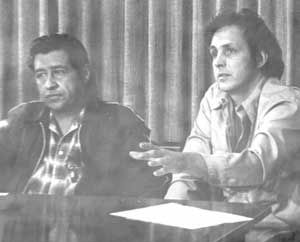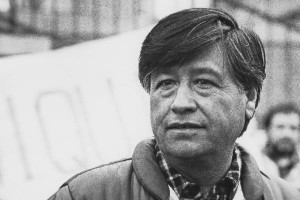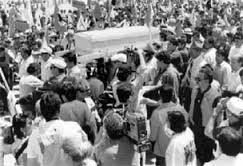March 31 marks what would have been the 87th birthday of an American hero, the late Cesar Estrada Chavez, founder and president of the United Farm Workers of America (UFW).

Twenty-one years after his death on April 23, 1993, a new generation of Americans is learning about the life of Cesar Chavez. A number of states, including California, will observe a Cesar Chavez holiday; there is a call for a national holiday. His headquarters, an abandoned former TB sanitarium in the Tehachapi Mountains, which Chavez later acquired and renamed “La Paz,” is now a national memorial that includes his burial grounds. A movie is being released celebrating his life, a life of selfless service for others.
Indeed, while he was alive, Cesar refused to sign away the movie rights to his life, though offered millions. He also refused offers to publish an autobiography or an “authorized” biography. He refused because he never sought personal recognition. It was not about him, he insisted. It was about La Causa, the cause of justice for farm workers. Thus, no movie was made until now, and the only authorized book was the “Autobiography of La Causa,” by Jaques Levy, who didn’t pay for it; he earned it by working for La Causa.
Although Cesar Chavez eschewed personal celebrity, he nonetheless became nationally and internationally renown for his work for others. But during his life, and to and beyond his death, even to this day, Cesar was defamed and burdened, and his cause impeded, by being branded falsely as a “Communist.” This defamatory cruelty was done by persons who should have known better, as most of those who self-righteously repeated that utterly false calumny defined themselves as Christians and patriots.
It pains me to this day that that good man, Christian to his core, should have been, and should continue to be, vilified as a “Communist” by people who have been misled by that lie.
For one instance, I was invited to address an annual gathering of activists convened by the late Rev. Dr. D. James Kennedy at his Coral Ridge Ministries, along with patriot author William J. Federer and others. Former Gov. Mike Huckabee keynoted the annual dinner. In the large Coral Ridge Chapel, Bill Federer received a rousing standing ovation after his speech from an enthusiastic crowd of at least a thousand Christian patriots, as I did after him. At the break following my speech, Federer and I walked out to the foyer where several hundred waited with questions. The very first question to me was: “That was a great speech. But how could you represent that Communist Cesar Chavez?” He had been dead for years, but the lie was still alive, even among otherwise well-informed Christian patriots.
 The answer to the lie was easy, however, because Cesar Chavez was no Communist. He was a Christian. A devoted Catholic Christian who did what he did as a follower of Jesus Christ, living his Christian faith daily, hourly, existentially not rhetorically. It was his Christian faith, his humility before God, that made Cesar Chavez what he was, and made him both good and great.
The answer to the lie was easy, however, because Cesar Chavez was no Communist. He was a Christian. A devoted Catholic Christian who did what he did as a follower of Jesus Christ, living his Christian faith daily, hourly, existentially not rhetorically. It was his Christian faith, his humility before God, that made Cesar Chavez what he was, and made him both good and great.
Although it is little known by those from the secular left who celebrate him as a civil rights leader as well as those who condemned him from the religious right as a Communist, in the Adult Catechism of the Catholic Church approved by Pope John Paul the Great, the section on “Life In Christ” includes as exemplifying a life in Christ: Cesar Chavez.
It should not need to be said that if anti-Communist Pope John Paul II believed that Cesar Chavez was not a “Communist” but a Christian of such proven faith that he should be the example of living a life in Christ in the Adult Catholic Catechism, that should be good enough proof for any doubter that Cesar Chavez was in fact a Christian, and profoundly so, and not the “Communist” his detractors maliciously claimed.
Indeed, Cesar Chavez, living his Christian faith, was the moral heart of the American labor movement, and there are lessons to be learned from his well-lived life.
My own life has been enriched beyond measure by working with him for some 20 years, from 1973, when he mentored me as a leader of the Truckers for Justice in a nationwide truckers shutdown during the so-called Arab oil embargo; through the many years I served as one of his attorneys until the day of his death on April 23, 1993, during an epic court battle in Arizona.
I was but one of thousands who worked with Cesar Chavez through the years. Others did so much more to help him, his cause and the UFW. I write these words not to celebrate my association with him, but to celebrate Cesar Chavez and the life he lived. Cesar Chavez, by his humble service and sacrifice for others, was not only a great man, but also a good man.
Cesar Chavez was born in 1927 on the small ranch near Yuma, Ariz., that his grandfather purchased in the 1880s. The Chavez family worked the ranch until 1937, when the bank foreclosed and the giant Bruce Church lettuce corporation took it over. The family went from being American landowners to “Mexican” migrant workers, living and working in appalling conditions.
 In 1944, as World War II raged, Chavez, at the age of 17, joined the U.S. Navy. When he came home on a three-day leave, he engaged in his first nonviolent civil disobedience by sitting in the “white” section of a segregated movie theater in Delano, Calif., with his date, Helen, who would later become his wife. He was arrested and taken to jail, but they couldn’t figure out what to charge this U.S. sailor with in wartime. So, they cut him loose with threatening warnings that he should know his “place.” Chavez went back to war in the South Pacific for the duration.
In 1944, as World War II raged, Chavez, at the age of 17, joined the U.S. Navy. When he came home on a three-day leave, he engaged in his first nonviolent civil disobedience by sitting in the “white” section of a segregated movie theater in Delano, Calif., with his date, Helen, who would later become his wife. He was arrested and taken to jail, but they couldn’t figure out what to charge this U.S. sailor with in wartime. So, they cut him loose with threatening warnings that he should know his “place.” Chavez went back to war in the South Pacific for the duration.
Ironically, Chavez’s life ended where it began, in Yuma, in a fight for justice against the same Bruce Church Corporation that had taken the Chavez family ranch during the Depression. Bruce Church sued Chavez and the UFW in Arizona courts in Yuma for millions of dollars in damages allegedly caused by a lettuce boycott Chavez had led in California, not Arizona.
Bruce Church’s lawyers called Chavez as a witness. When his examination by Bruce Church’s lawyers was complete, Chavez went to the home of a UFW member where he was staying. Cesar Chavez died peacefully in his sleep that night, April 23, 1993.
Those who entered the room in the morning when he did not respond to their knock said his shoes were off, but he was still dressed, as if having dozed off while reading. They said there was no evidence that he had suffered any pain or distress. Indeed, the book he was reading still rested on his chest undisturbed. Further, they said it appeared that Chavez had a small, serene smile on his face. “God came and took him,” an elderly campesino told me.
More than 50,000 people attended Chavez’s funeral in Delano, Calif., where he had gone in 1962 with his wife, Helen, and eight children to organize what would ultimately become the United Farm Workers of America.
When the trial resumed in Arizona. I was honored to be one of the attorneys defending the UFW and Chavez. Even though Chavez died before he had a chance to tell his side of the story, the judge refused to grant a mistrial. As expected, the jury found for Bruce Church, the biggest employer in the Yuma area. Bruce Church was awarded $3.5 million, enough to bankrupt the UFW.
But, following Cesar’s example, his son-in-law and successor as UFW president, Art Rodriguez, didn’t quit. After years of litigation, the UFW won the case on appeal. The judgment was thrown out by higher courts, primarily on a ground we had insisted on from the beginning: Arizona had no jurisdiction over a boycott in California.
Chavez’s son, Paul, once said to me of his father’s persistence in the face of adversity: “Did you have one of those little cars when you were a kid that you wind up and it takes off, and when it hits a wall it bounces off then hits the wall again, and again, and again? Well, my dad reminds me of that little car. It won’t quit. But the difference is, with my dad, the wall falls down.”
Cesar Chavez lived with constant death threats. Five UFW workers were killed in UFW’s struggle – shot, stabbed, beaten and, in one instance, run down by a truck while on a picket line.
Through it all, Cesar never wavered from his adherence to non-violence. His small office was full of books on non-violence in general and Ghandi in particular. Cesar was to become in America what Gandhi was to become in India: a “Mahatma” – a “great soul.”
I have never forgotten the lesson on non-violence he taught me back in 1973, when I was a long-haul trucker involved in the nationwide truckers’ shutdown protesting the escalation in diesel fuel prices by the “Seven Sister” oil companies during the so-called Arab Oil Embargo. Thousands of owner-operator truckers were driven out of business by the fuel price gouging. Congress later investigated and found the oil companies guilty of illegal “windfall profits” in the so-called embargo.
I had called on Cesar to have his lawyers help us in the strike. He did and mentored me in daily phone calls. There was violence in many parts of the country. After two weeks on strike with over 250 truckers shut down in the Triple T Truckstop in Tucson, I told Cesar that I didn’t know if I was going to be able to control violence.
Chavez admonished me so loudly and emphatically regarding violence that I had to hold the phone away from my ear: “Rees, if there is violence, it is your fault: It is a failure of creative intelligence; a failure of creative intelligence.”
At the time, I said to myself: “What does he know? I’m the one here, I’m the one with the problems.” But later that day I picked up the newspaper and spotted a story saying the Tucson blood bank had run out of blood and needed help. I called a meeting, pointed out that we were getting lambasted by the media over our strike, and if we gave blood to the people of Tucson, maybe we would be seen in a different light. The truckers voted to give blood, and I called the media.
The next day, we loaded up the trailers of two 18-wheelers with strikers and drove to the blood bank. With television cameras running, out of the trailers came the truckers, cowboy-hatted and cowboy-booted, John Wayne-patriots, big, tall and proud, to give their blood to the people of Tucson.
The entire atmosphere changed. The media began telling our story, and the people of Tucson began taking truckers into their homes for the duration of the strike. The threat of violence evaporated – thanks to Cesar Chavez.
We created an Alliance of the United Farm Workers and the Truckers for Justice in the aftermath of that strike. It caused a real commotion – Deep South truckers (I was the only “Yankee”) joining with Cesar Chavez, a Mexican-American union leader whom they had been propagandized to believe was a “Communist.” However, Cesar won them over very quickly with straight-forward common sense when we negotiated the UFW-TFJ Alliance at his headquarters.
The late A.S. “Pappy Phifer,” who sounded just like Yosemite Sam and was built like a bowling ball with feet, and was just as hard, was our TFJ president. He had begun trucking as a member of Jimmy Hoffa Sr.’s Teamster Local in Detroit before moving back home to Georgia and buying his own truck. He came right to the point: “Mr. Chavez, they tell us back home that you are one of them Communists?”
Cesar Chavez looked around the room linking eyes with every trucker in the room, all of whom towered over him, before quietly saying: “I’m a Christian. How could I be a Communist?”
That simple truth made sense to every trucker on the negotiating team. Each one was a Christian and knew Cesar couldn’t be a Communist. Confidence was struck, and so was a deal when the details were worked out.
The news media splashed the story of Southern truckers agreeing not to haul “scab” non-UFW lettuce and grapes and Cesar Chavez agreeing to help truckers in round two of strike activity over the fuel prices. Within 24 hours we were receiving death threats in the TFJ and being denounced for joining forces with “that Communist Cesar Chavez.” “Pappy” Phifer never backed down because of the death threats. We never again hauled a “scab” grape or head of lettuce and, never retreated from the alliance with Cesar Chavez. “Pappy” Phifer, in the heart of KKK country, Christian and anti-Communist to his bones, remained publicly and defiantly proud of his association and friendship with “Mr. Chavez,” to the day of Pappy’s death.
After the second strike was broken, Cesar told me that I needed to go to law school so I could better serve. It was his recommendation that opened the doors of law school to me. After graduation and passing the Bar in 1979, I became one of the volunteer attorneys for the UFW and Chavez.
I have devoted my entire legal career defending civil rights, workers rights and veterans rights. I am guided to this day by the lessons taught me by Cesar Chavez: Never surrender in the cause of justice, act with audacity, but always remember that “violence is a failure of creative intelligence.”
I am infinitely grateful to Cesar Chavez for these lessons, and most of all for the lesson and example of his life. I will always walk in his shadow.
Rees Lloyd originally wrote this piece for World Net Daily which can be found here. He has written several pieces about Cesar Chavez for VictoriaTaft.com for which he is a contributor. He coined the term “Blogforce.” Now you know why.



